All You Need to Know about Kroll Background Checks
- Blog
- Employment Background Check Errors
All You Need to Know about Kroll Background Checks

Kroll background checks reduce risks for employers. But sometimes, reporting errors harm job candidates instead.
Background checks are a standard part of the hiring process. Kroll is one company that scours the internet for information about you. Too often, Kroll background check reports contain mistakes, and when that happens, you lose out. Here’s what you need to know about Kroll, background check errors, your rights, and what to do next.
Kroll Inc. (Kroll) is a large company that provides varied risk management, due diligence, and screening services to businesses worldwide. One of those services is Kroll background screening. Before hiring someone, a company hires Kroll and pays for a Kroll background check on that person. Depending on the industry and what the employer wants Kroll to look for and how far back the employer wants Kroll to look, a Kroll background screening check could include a criminal background check, employment verification, educational verification, credit check, social media review, and overall reputational review. Kroll can tailor their Kroll background screening report to meet the needs of various industries, employers, and business sectors.
Individual background checks have become a standard part of finding a job. Technology has made it possible to search thousands of online databases and get information from thousands of sources very quickly. Employers like this speed and like the idea of minimizing their risk when it comes to hiring someone. But like any background check company, a Kroll check can contain errors, and when those errors happen, the employer is not getting an accurate picture of the job candidate. As consumer law attorneys, we work tirelessly to ensure that things are fair for people when people are facing large companies engaged in processes that do not always treat people fairly.
This article provides an overview of the Kroll individual background check and what to do if you’ve found an error in your Kroll employment screening report.
About Kroll Company
Kroll was founded in 1972 by Jules Kroll as a corporate consulting company. A company called Duff & Phelps bought Kroll in 2018 but later determined that it should keep the Kroll name. Kroll provides numerous corporate services, including cybersecurity assessment, financial investigations, forensic accounting, background screening, and third-party due diligence. Kroll class action services provide companies with analysis on class action settlements; Kroll identity theft services advise companies on cyber security to minimize identity theft. Kroll credit services provides credit risk assessments to financial institutions.
How Does Kroll Conduct Background Checks?
Depending on the type of Kroll report an employer requests, the Kroll screening report can contain the results of public records, criminal records, litigation research, credit reports, education verification, job history verification, rental history, and professional license verification. Kroll will search thousands of databases for a job candidate’s criminal history. Kroll will also contact a subject’s former employers and former schools to verify that the job candidate’s history is what the job candidate says it is. A Kroll credit report will contain a job candidate’s financial history.
How Long Does a Background Check from Kroll Take?
The length of time a Kroll background check will take will depend on the amount of research Kroll will have to do. A simple check will take a few days, while more comprehensive checks will take a couple of weeks. It all depends on the number of databases that Kroll has to search, along with the number and location of the employers and schools with which Kroll needs to verify information.
What Information Does Kroll Provide in Their Background Checks?
Kroll's background reports give employers a job candidate’s criminal history, financial history, employment confirmation, education confirmation, and verification of professional licenses and affiliations. The Fair Credit Reporting Act (FCRA) prohibits Kroll from including some information in its background check reports.
Kroll Criminal Background Check
Any convictions for job candidates will most likely be found in a state or county criminal database. Kroll will check the state and county databases for criminal records. Depending on the laws of the state, this may also include arrests. However, the FCRA prohibits Kroll from including convictions older than seven years. Kroll will also likely search national databases like the National Sex Offender Registry and the FBI’s criminal database.
Criminal background check errors can do a great deal of damage - life-altering damage - to a job candidate’s reputation, income potential, and opportunities.
Kroll Background Checks for Rental Property
In some scenarios, a landlord or property manager will request a rental history report on an applicant for an apartment.
Kroll Background Check for Employment
This will likely include a criminal background check, employment history verification, education verification, and, depending on the industry and the employer’s tolerance for risk, a credit report, social media usage report, and other reputational inquiries.
What Are the Consumers’ Rights when Verifying Their Background Check?
The FCRA gives consumers rights regarding background checks, including from large companies like Kroll. These rights include:
- The right to be informed of the background check
- The right to withhold consent from the background check. Note that if you do withhold consent, you may be ineligible for the job or opportunity in question.
- The right to dispute inaccuracies in the report
- The right to receive and review the background check report once it is available.
- The right to be informed if something in the report has negatively affected your employment opportunity and to know which specific information caused the rejection or denial.
Which Companies Use Kroll for Background Checks?
Kroll has many clients in many industries. Any company interested in reducing its risk by confirming that it is only hiring certain people will engage Kroll to do background checks.
Can Errors Occur in Background Checks from Kroll?
Yes, even with all the automation and technology, errors still occur in Kroll background checks. This is especially troubling as the FCRA requires companies like Kroll to use reasonable measures to ensure that its background check reports are accurate. But as Kroll background searches America’s databases, it often makes mistakes.
What Causes Errors in Background Checks?
Errors happen for many reasons, from typographical errors to data mix-ups to mistaken identity.
Main Types of Errors
There are many types of errors. A misspelling of your name can pull someone else’s data. Kroll can also make a mistake and retrieve old or inaccurate information from criminal databases. Duplicate items might appear. Kroll has also erroneously reported that a living person is dead.
How Often Do Errors Occur in Background Checks from Kroll
There is no data on Kroll specifically. But based on past statistics, around 10,000 people have eros in their background check reports yearly. However, just one error is too many for the person who does not get a job because of that one error.
What are the consequences of having errors in your background check report?
The employer does not get an accurate picture of who you are, no matter how big or how small the error may appear. Even the slightest error can create huge problems for you when you’re looking for a job, and when you don’t get a job, the consequences are hard to measure. What would your career have been like if you had gotten the job? What is the damage to your reputation when people in your industry hear about the background check? How much does an opportunity cost?
You should contact Consumer Attorneys when you identify an error in your Kroll background check report.
You Can Contact Kroll if You Need to Correct an Error in the Background Report
If you find mistakes in your Kroll report, you can dispute the error with Kroll. Write a dispute letter identifying the problem, include evidence, and send the dispute letter via certified U.S. mail to: Kroll, Background Dispute, 55 East 52nd Street 17 Fl., New York, NY 10055.
What to Do if You do not Receive Answers to Your Questions on the Background Report
The FCRA requires Kroll to investigate the dispute, correct its error, and provide you with a response as to the findings of its investigation within 30 days of receipt of your dispute letter. If Kroll does not do this, it violates the FCRA, and legal action might be appropriate, especially if you have already lost a job or otherwise suffered due to the error.
You Can Sue Kroll if Your Report Contains Errors
Sometimes, a lawsuit is the only way to hold Kroll accountable for its errors.
Who Can You Contact to Solve the Problem With an Error in the Background Report from Kroll
Contact Consumer Attorneys. The sooner you contact Consumer Attorneys, the better. We can assess the case, assess the scope of Kroll’s error, assess the damage, and, if necessary, sue Kroll. The sooner we hear your story, the better it is for you.
Sometimes, large companies do not listen to one consumer the same way they listen to a law firm.
Assistance in Disputing Kroll Background Report
Even if a lawsuit isn’t required, we can help you file a dispute, monitor that dispute, and guide you through the whole dispute process. You will not pay Consumer Attorneys any out-of-pocket costs for representing you, including a free consultation. If you win, the FCRA makes Kroll pay your attorney fees and costs.
Contact us
Contact us if you’ve found errors in your Kroll background check report, Kroll credit check, Kroll employment screening, or any Kroll screening report. Our firm protects consumers' rights and ensures companies like Kroll follow the law and treat people fairly. We know how to initiate a Kroll lawsuit, negotiate with Kroll attorneys, and generally hold Kroll accountable to the law.
Contact us by:
- Email us at info@consumerattorneys.com to request a meeting with an attorney.
- Call us at 1-877-615-1725.
We have represented thousands of consumers at odds with consumer reporting agencies, background check companies, and many others. Our goal is to hold these companies accountable when they make mistakes that hurt you, to get consumers the compensation they deserve, and to ensure things are as fair as possible.
Frequently Asked Questions
The Fair Credit Reporting Act (FCRA) requires employers to get your permission before they run a background check on you and tell you when they do. The FCRA also requires employers to tell a job candidate if they make adverse employment decisions based on anything they discover in the background check report. When an employer engages Kroll, you should know when they start a background check. If you don’t hear anything negative, you will know Kroll is still researching you.
Turnaround time is likely between a few days and a couple of weeks. This depends on the sort of background check the potential employer requests and the scope and length of the job candidate's background. If a job candidate has lived in many different places, lived overseas, attended many schools, had many jobs, or has many professional licenses, the time it takes Kroll to search all relevant databases and verify all past employment and education will increase.
A standard Kroll background check looks for any criminal history on the federal, state, or county level, verifies past employment, verifies past education, and confirms professional licenses. Some employers ask Kroll to do more in-depth background checks, including credit reports, social media activity, financial information, litigation history, and other reputational measures. Employers want to minimize the risk they take by hiring someone so they can keep their workplace safe, their clients safe, and their reputation intact.
Kroll will review relevant federal, state, and county criminal databases for an individual's criminal history within the confines of the Fair Credit Reporting Act. Depending on the nature of the job and the state, this criminal information may include arrests. Kroll can usually only report criminal activity from the last seven years, but there are exceptions to this rule when it comes to reporting crimes of a sexual nature, violent crimes, and thefts. Kroll will also verify a subject's past employment with past employers and verify the subject has the education they say they do.


Daniel Cohen is the Founder of Consumer Attorneys. Daniel manages the firm’s branding, marketing, client intake and business development efforts. Since 2017, he is a member of the National Association of Consumer Advocates and the National Consumer Law Center. Mr. Cohen is a nationally-recognized practitioner of consumer protection law. He has a we... Read more

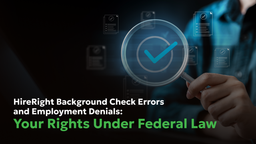


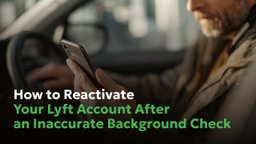
Related Articles
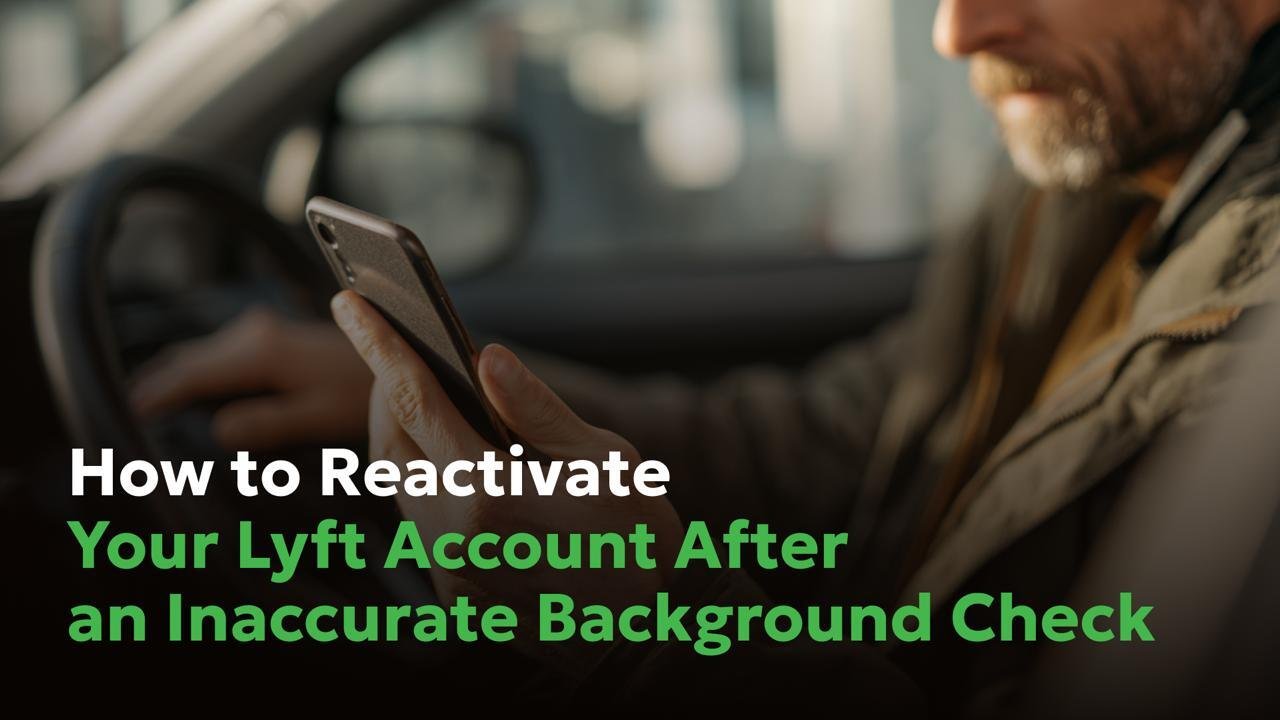
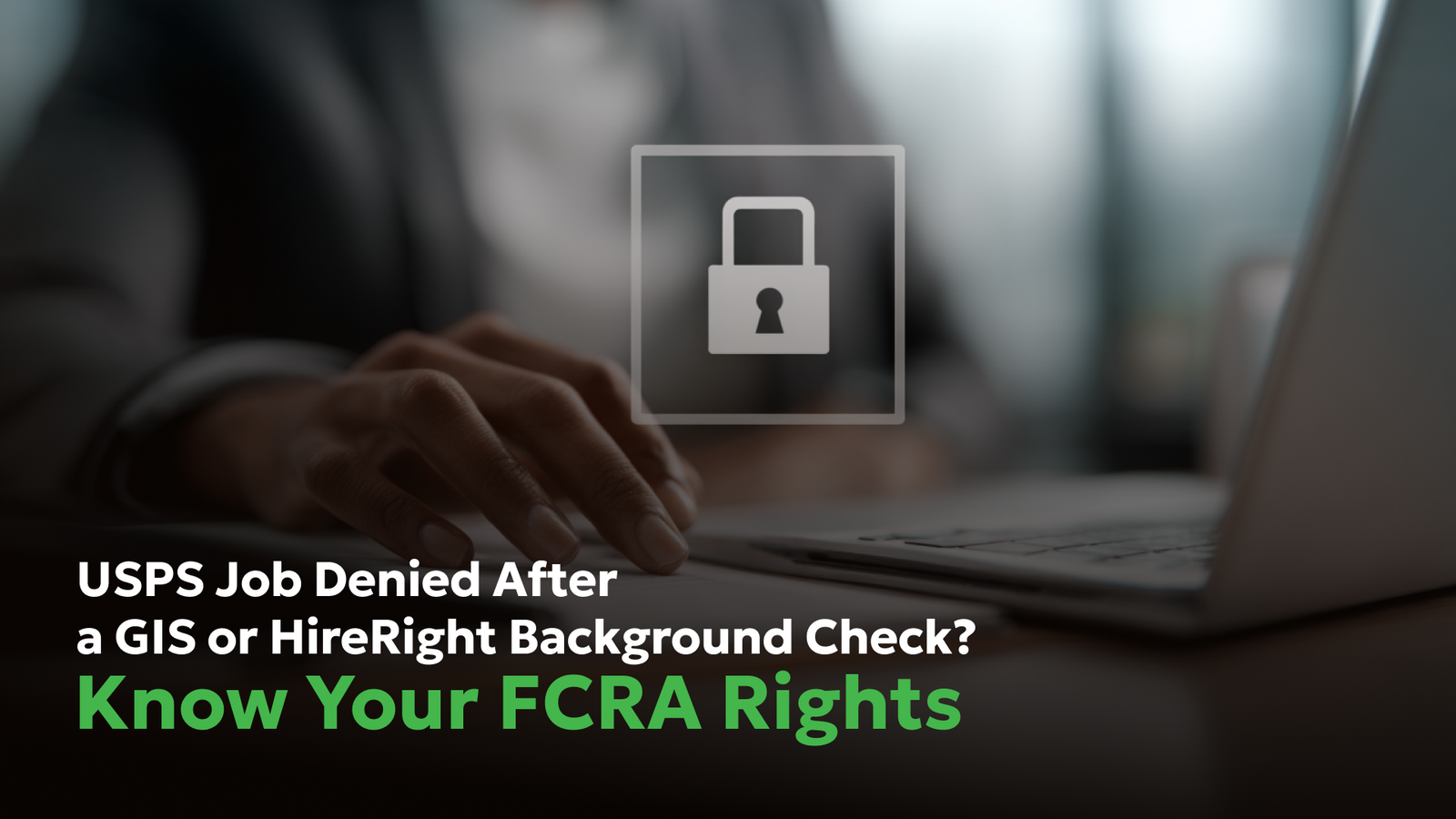
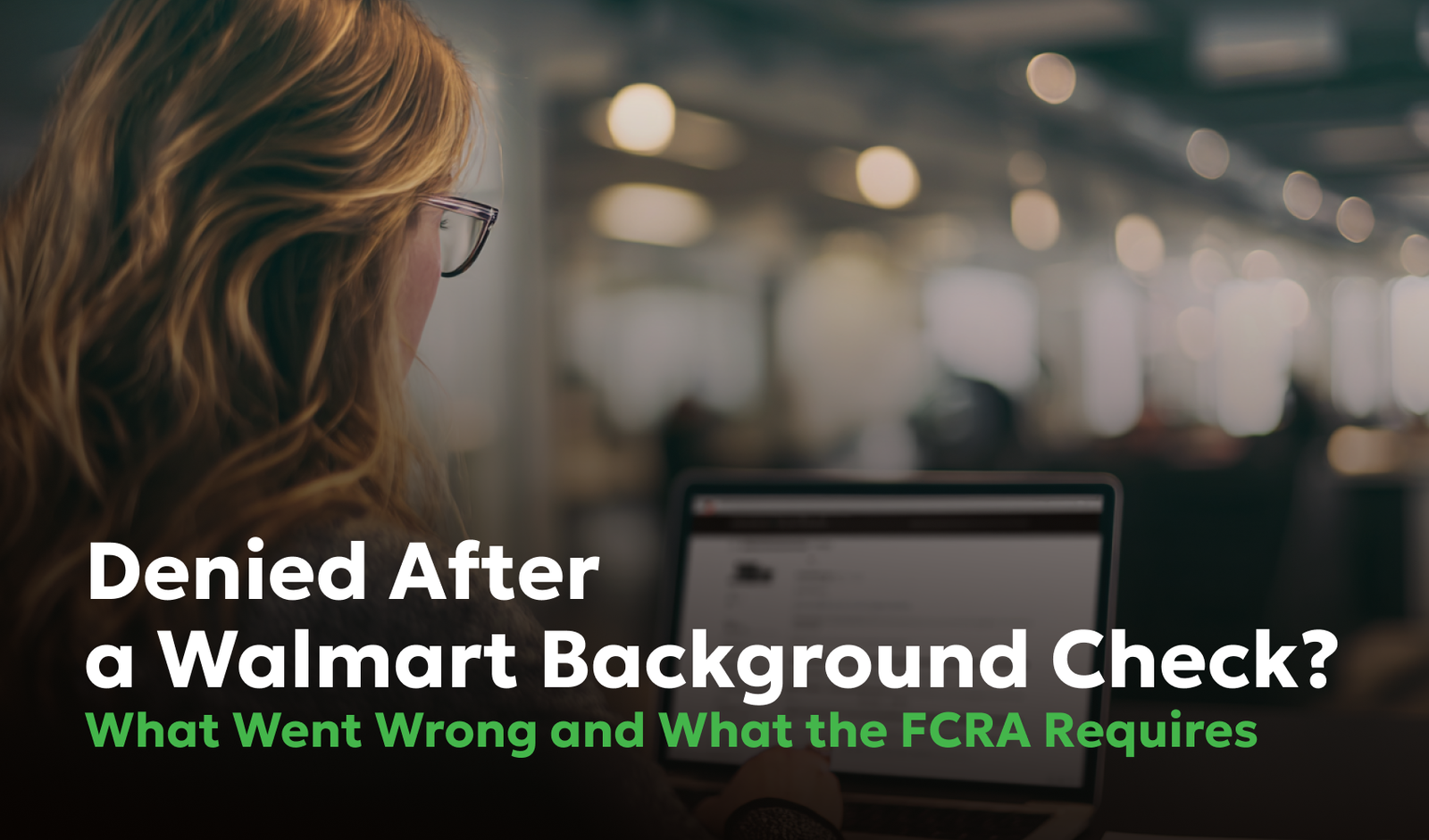

R
ONGS™You pay nothing. The law makes them pay.


